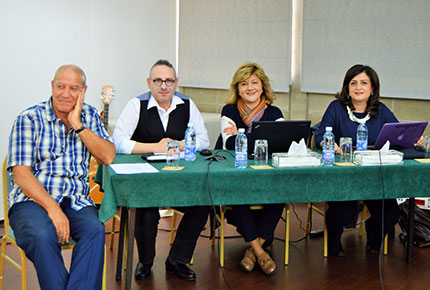Linguistic alienation
LAU professors from different disciplines discuss the limits of words and their impact on our everyday life.
Have you ever been aware of your own alienation to language? Did you ever think that words failed to express the real nature of your feelings? Or that some discourse had any control over your thoughts, knowledge and freedom?
Four LAU professors from different disciplines recently met precisely to discuss the limitations of words and their impact on our lives at different levels.
“Words are often reductive and inadequate to transport and fully represent genuine feelings,” said George Sadaka, lecturer in the Department of English, using the concept of the Big Other by Jacques Lacan. “Take the word ‘love.’ When I say ‘I love you,’ what do I mean by ‘love’? Is it one singular word and one monolithic feeling? Can it be polyvalent? Can it be more than one expression condensed together? … Need is not love, pain is not love, possessiveness is not love, desire is not love, but love is all of these things together and more. So when I give ‘love’ a representation I am killing it, I am reducing it, I am being driven by the limits of my word.”
According to Sadaka, as children learn to speak they become subject to a pre-existing language, a pre-existing system, conforming to its rules and regulations, to its limits and restrictions. “Words and language become a system of representation that regulates our lives,” he explained.
Another feature of language that takes this alienation further is discourse. “According to Michel Foucault language enters discourse, which entails polymorphic techniques of power and which is manipulative and mystifiying of truth.” To clarify his point, Sadaka gave the example of Andreas Lubitz who deliberately crashed the Germanwings plane he was piloting. “Had he been a Muslim, his act of suicide would have been labeled as ‘terrorism’ … In such cases, words are used to conceal the truth rather than bringing out the will to inform.”
Discourse is also alienating to the human body, explained Nidale Daccache, associate professor at the Humanities Department. Daccache discussed how words shackle the body with the bonds of language and ensuing cultural conventions. “For the body to be liberated, it needs to be de-tabooed through the use of the right words joined with the act of liberation,” she argued.
According to May Hamdan, associate professor at the Computer Science and Mathematics Department, “using words to represent abstract truth is similar to using a two- dimensional medium to represent a three-dimensional object.” The choice of words in a new mathematical definition is crucial because a word is naturally pre-equipped with a chain of meanings. One would think that using symbols in place of words would remedy such a “bias;” however, this could slow down learning and make the material totally unappealing and far removed from anything the learner is acquainted with. A wise combination of unbiased symbols and loaded words is the balance sought.
Such a balance applies to the relation between body language and verbal communication, argues Pierre Sarkis, from the Department of Humanities Sarkis directed the audience through four main aspects of body language that ruin communication because they create a distraction to the interlocutor or any large audience: eye contact, posture/movement, hand movements, and facial expressions. “Body language should go in tandem with our words and should respect the specificity of the occasion,” he explained.
Hosted by the Department of English, this symposium closed the discussion on the paradox of the power/weakness of words initiated by Symposium I last year. A third Symposium aspires to link the discussion of words to other media and specific fields of expertise at LAU.
More
Latest Stories
- How Does Digital Media Impact Our Brain?
- Community Development Takes Root at Capstone Presentation Day
- LAU Athletes Return Victorious from Athens and Belgrade
- A New Initiative Toward Harnessing Digital Transformation
- A Cardiovascular Conference to Streamline National Expertise
- Aspiring Engineers Compete for Scholarships at LAU
- The School of Engineering Delivers Immersive Learning Experiences
- Consultants in the Making


